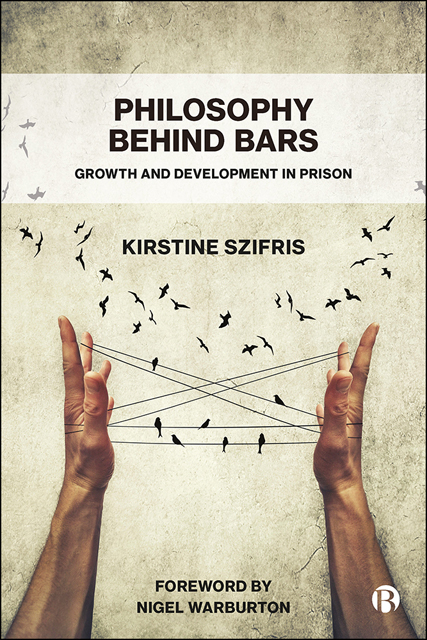Book contents
- Frontmatter
- Dedication
- Contents
- List of Boxes
- Acknowledgements
- Foreword
- 1 Philosophy, Identity and the ‘Ship of Theseus’
- 2 Towards Theory: People, Places and Voices
- 3 Survival, Plato and the Ideal Society
- 4 Kant, Bentham and the Question of Identity
- 5 ‘Why Do You Think That?’ Descartes, Hume and Knowledge>
- 6 Not Just an Offender, But a Person
- 7 Trying to Find a Community of Philosophical Inquiry
- 8 Finding Trust and Developing Relationships
- 9 Personal Self-Exploration
- 10 Towards a Framework for Understanding Philosophy in Prison
- 11 Final Reflections
- Appendix: Technical Methods
- Bibliography
- Index
3 - Survival, Plato and the Ideal Society
Published online by Cambridge University Press: 15 April 2023
- Frontmatter
- Dedication
- Contents
- List of Boxes
- Acknowledgements
- Foreword
- 1 Philosophy, Identity and the ‘Ship of Theseus’
- 2 Towards Theory: People, Places and Voices
- 3 Survival, Plato and the Ideal Society
- 4 Kant, Bentham and the Question of Identity
- 5 ‘Why Do You Think That?’ Descartes, Hume and Knowledge>
- 6 Not Just an Offender, But a Person
- 7 Trying to Find a Community of Philosophical Inquiry
- 8 Finding Trust and Developing Relationships
- 9 Personal Self-Exploration
- 10 Towards a Framework for Understanding Philosophy in Prison
- 11 Final Reflections
- Appendix: Technical Methods
- Bibliography
- Index
Summary
“We need a leader.” Cady is the first to respond. A young man, in his mid-20s, with an extremely long sentence to serve, Cady's formative years were characterized by gang membership. Now, several years into his sentence, he has been in HMP Grendon for a few months. Phil, in his mid-30s, with a history of drug abuse, disagreed. “There's only 20 people, we don't need a leader.”
“People are selfish, we need structure to keep [a] check on behaviour,” Michael chimes in. Phil disagrees again, and the conversation moves towards a discussion of democracy, ruling by consensus and class systems. Living, as these men do, in a democratic therapeutic community (TC), there is a clear understanding of constitutions, voting procedures and social responsibility. However, when I ask if any of them had actually voted when they were on the outside, not one of them had. When I ask why democracy was suggested as a means of choosing a leader, Cady admitted that he had got the idea from the TV show, Lost. They had done it on there, and so it seemed sensible to him.
Other than discussing how to choose a leader, the story of the shipwreck prompts discussion of the allocation of tasks. Having used this with a range of groups, most suggest using people's existing skills and allocating tasks accordingly. This, in turn, leads to discussions around choice – should people be allowed to choose their activities? Or should they do the activity to which they are most suited? Some groups focused closely on the specifics of the story – it's a dark and stormy night, it's 2,500 years ago – taking its contents more literally. Other groups quickly moved on to more abstract discussions of how work might be allocated, and how a society such as this could be structured.
One of the group discussions (at HMP Full Sutton) turns to the concept of power. How would power be wielded? Who would control the situation? Dave, a large self-conscious man who often made particularly insightful comments, pointed out that power might sit with the person who has the most prized skill. He gave an example of a community needing a blacksmith's skills but there being only one blacksmith.
- Type
- Chapter
- Information
- Philosophy behind BarsGrowth and Development in Prison, pp. 39 - 54Publisher: Bristol University PressPrint publication year: 2021

